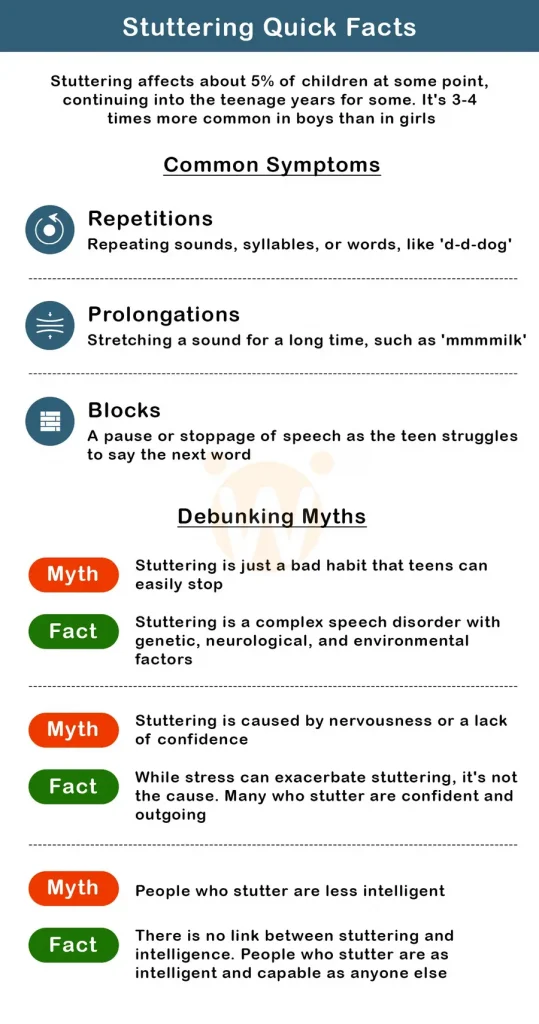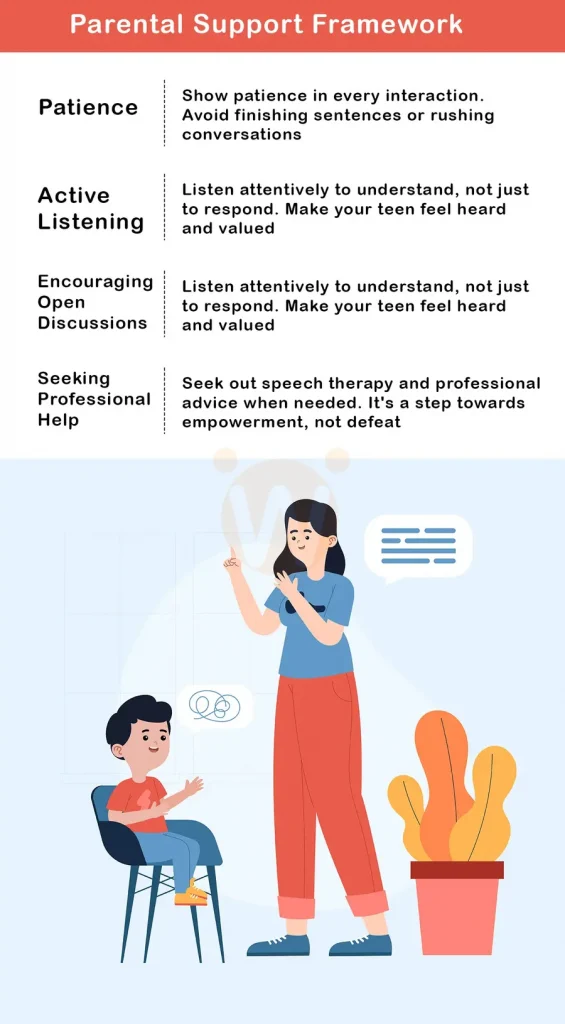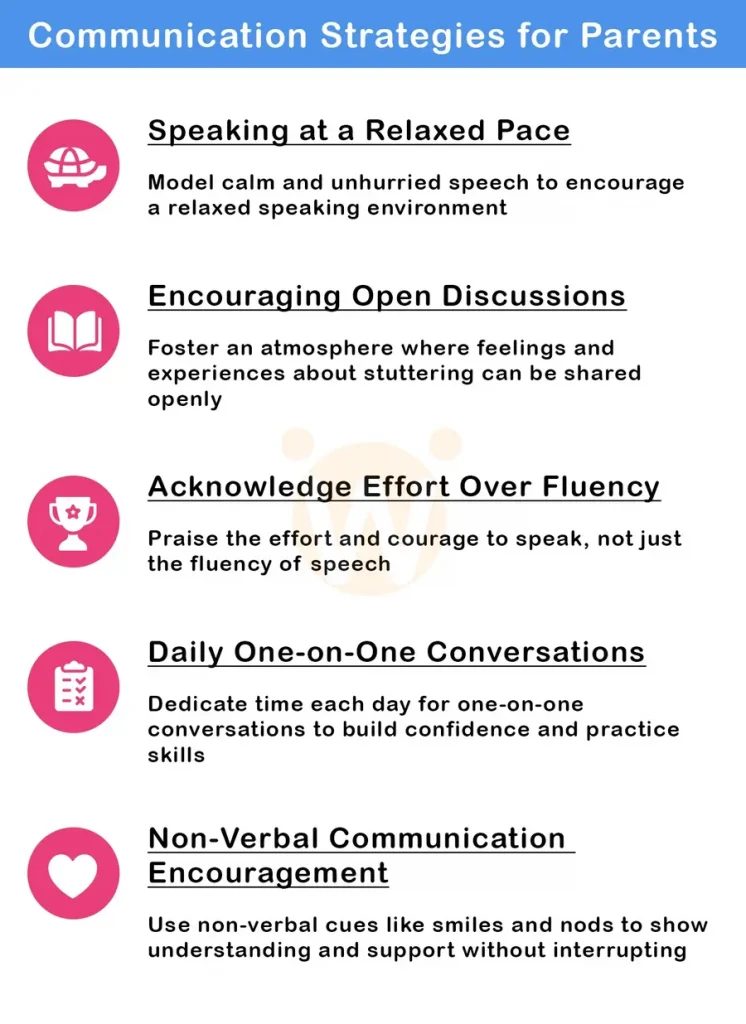The Role of Parents in Helping Teens with Stuttering
By Rajini D
Last Updated: February 13, 2024
Navigating the waters of teenage years can be challenging, both for parents and their teens. When stuttering enters the mix, these challenges can sometimes feel amplified. It’s not uncommon for parents to feel a mix of concern, helplessness, and a strong desire to support their child through this period. If you’re a parent witnessing your teen navigate stuttering, you’re not alone.
Stuttering, especially during the teenage years, requires a nuanced understanding and approach. This is a time when your teen is already dealing with various changes—physical, emotional, and social. The addition of stuttering can affect their self-esteem, social interactions, and communication in significant ways. However, the role of parents in this journey is invaluable. Your support, understanding, and encouragement can make a world of difference in how your teen experiences and manages stuttering.
Understanding and managing teenage stuttering doesn’t have to be a journey you or your teen embark on alone. The right support, information, and strategies can empower both of you to navigate this period with confidence and optimism.

Explore more on What are the Tips for Parenting an Autistic Child? | Helping Your Child with Autism
Understanding Teenage Stuttering
Navigating through teenage years can be a complex journey, filled with new experiences and challenges. For some teens, stuttering is part of this journey. But what exactly is stuttering, and why does it occur in some teens and not others? Let’s dive into a simple understanding of this condition and its causes, keeping the conversation light and easy to follow.
What is Stuttering?
Stuttering is a speech disorder that affects the flow of speech. It can manifest in several ways, including:
- Repetitions: This is when a sound, syllable, or word is repeated, like “w-w-w-what.”
- Prolongations: A sound is stretched out for a longer period, such as “ssssssso.”
- Blocks: There might be a pause before a word is spoken as the person struggles to get the words out.
It’s a widespread condition, touching the lives of many teenagers across the globe. Stuttering can vary from person to person in its frequency and intensity, and it’s a part of many teens’ lives as they navigate through school, social interactions, and personal development.
Also read: What is Stuttering: Types, Symptoms, and Causes
Causes of Stuttering in Teens
Stuttering doesn’t have a one-size-fits-all explanation. It’s believed to stem from a mixture of factors that might include genetics, neurological development, and the environment. Here’s a brief overview:
Genetic Factors: Stuttering can run in families, suggesting that genes play a role in its development.
Read more about Early Identification/ Warning Signs in child development
Neurological Factors: Differences in the way the brain processes language and speech can contribute to stuttering. This doesn’t mean those who stutter are less intelligent; their brains just work a bit differently when it comes to speaking.
Environmental Factors: Stressful life events or significant changes in a teen’s environment can trigger or exacerbate stuttering.
Understanding stuttering is the first step towards empathizing and supporting teens who experience it. It’s important to recognize that stuttering is just one aspect of a person’s identity and doesn’t define them. With the right support and strategies, teens who stutter can communicate effectively and confidently.
The Role of Parents in Supporting Teens

As parents navigate the complexities of teenage stuttering, their role shifts towards becoming a cornerstone of support and understanding. Creating a nurturing environment and empowering teens through informed conversations are pivotal steps in this journey. Here’s how you can make a significant difference.
Creating a Supportive Environment
A supportive home environment serves as a safe haven for teens, especially those grappling with stuttering. Here are some practical ways to foster such a space:
Embrace Patience: Show patience in every interaction. Avoid the urge to complete sentences or correct your teen’s speech. This patience communicates acceptance and understanding, which are crucial for their confidence.
Listen Actively: Ensure your teen feels heard. Active listening goes beyond just hearing words; it involves understanding the message and showing empathy. This practice encourages your teen to express themselves without fear of judgment or interruption.
Reduce Pressure: Minimize situations that may heighten your teen’s anxiety about speaking. Encourage family members to take turns during conversations, allowing everyone, including your teen, to speak without feeling rushed or pressured.
Creating a relaxed, pressure-free communication space at home helps teens feel secure, reducing the stress associated with stuttering. It’s about making them feel valued and understood, irrespective of their fluency.
Go through our article for more info on Speech Therapy at Home: Top Tips For Parents.
Empowering Through Understanding
Knowledge is empowering. By educating yourselves about stuttering, you can demystify the condition for your teen and for yourselves. Here’s how to go about it:
Seek Information: Utilize reputable resources to learn about stuttering. Websites like Wellness Hub offer articles, expert advice, and resources that can deepen your understanding of stuttering without overwhelming you or making it the focal point.
Initiate Informed Conversations: Armed with accurate information, engage your teen in discussions about stuttering. Such conversations can dispel myths and reduce stigma, making your teen feel more comfortable with their speech pattern.
Promote Confidence: Use your knowledge to bolster your teen’s self-esteem. Highlight their strengths and encourage them to pursue interests and activities that build confidence, showing them that stuttering does not define their capabilities or worth.
Also read: Understanding Language Disorders: Causes and Characteristics
Strategies for Creating a Supportive Home Environment
| Strategy | Description | Implementation Tips |
|---|---|---|
| Relaxed Speaking Pace | Encouraging a slower, more deliberate way of speaking to reduce pressure. | Model this behavior yourself; remind family members to take their time. |
| Listening Sessions | Dedicated time for your teen to speak without fear of interruption. | Set aside a regular time each day for one-on-one conversations. |
| Positive Reinforcement | Acknowledging efforts to communicate, regardless of fluency. | Praise the content of what’s said, not how it’s said. |
| Stuttering Education | Educating the family about stuttering to increase understanding and support. | Share articles, videos, and resources from reputable sources. |
| Encouraging Expression | Motivating your teen to express themselves through various mediums. | Support participation in art, writing, or other non-verbal activities. |
Effective Communication Strategies

Navigating the path of stuttering with your teen involves more than just understanding and support; it requires adopting effective communication strategies that promote confidence and ease in speaking. Here are practical ways to achieve this.
Speaking at a Relaxed Pace
One of the most impactful ways parents can support their teens is by modeling slow and clear speech. This doesn’t mean exaggerating slowness but adopting a calm and measured pace when speaking. Here’s how it can help:
Demonstration of Calmness: Your speech pattern serves as a live demonstration for your teen, showing them that communication isn’t a race. It encourages them to take their time, reducing the pressure they may feel to speak quickly or fluently.
Building Speaking Confidence: Engage in daily one-on-one conversations with your teen, where the environment is relaxed, and they feel no rush to speak. These moments can significantly boost their confidence, as they provide a safe space for practice and expression without fear of judgment.
Read more: 7 Key Techniques for Overcoming Stuttering
Encouraging Open Discussions
Open discussions about stuttering can be incredibly beneficial. These conversations allow your teen to express their feelings and experiences related to stuttering, fostering a deeper understanding and connection. Here are some tips to encourage these discussions:
Create a Safe Space: Make it clear to your teen that they can talk about anything, including their stuttering, without fear of criticism. This openness can make a significant difference in their willingness to share.
Acknowledge Effort Over Fluency: Praise and acknowledge your teen’s effort to communicate, regardless of fluency. This approach shifts the focus from how they speak to what they’re saying, valuing their thoughts and feelings above all.
Encourage Expression of Feelings: Encourage your teen to express how they feel about their stuttering. This can include any frustrations, fears, or even achievements they want to share. Validating these feelings can help them cope with their emotions more effectively.
By incorporating these strategies into your daily interactions, you create an environment where your teen feels seen, heard, and supported. This not only aids in their communication skills but also strengthens your relationship, providing them with the solid foundation they need to navigate the challenges of stuttering.
Seeking Professional Help
Recognizing when to seek professional help is crucial in supporting your teen with stuttering. While every teen’s journey with stuttering is unique, there are certain signs that indicate the need for a specialist’s intervention.
When to Seek Help
- Prolonged Stuttering: If stuttering persists for more than 6 months, it might be time to consult a speech therapist.
- Increasing Difficulty: Noticeable increases in the frequency or severity of stuttering episodes warrant professional advice.
- Social Withdrawal: If stuttering is impacting your teen’s willingness to communicate or participate in social activities, a therapist can offer strategies to cope.
- Frustration and Anger: Emotional responses to stuttering, such as frustration or anger, suggest that your teen could benefit from support beyond what can be provided at home.
How to Seek Help
- Find a Specialist: Look for a speech therapist who specializes in stuttering. Many therapists have specific training and experience in fluency disorders, and finding the right match for your teen is important.
- Consult Your Doctor: A referral from your family doctor or pediatrician can be a great starting point. They can often recommend trusted therapists with expertise in adolescent stuttering.
For more info go through our article on Best Online Speech Therapy in Hyderabad.
Benefits of Therapy
Speech therapy can provide your teen with strategies to manage stuttering more effectively, reducing the impact on their daily life. Therapy can also offer emotional support, helping teens build confidence in their communication abilities.
WellnessHub stands as a resource for connecting parents with professionals who specialize in adolescent stuttering. By visiting Wellness Hub, you can find expert articles, therapist directories, and support resources tailored to your needs.
Learn more about What are the therapies offered to Autistic patients? | Therapies of Autism
Beyond Speech: Building Self-esteem and Coping Skills
Supporting your teen in stuttering management extends beyond speech therapy. Building self-esteem and coping skills are equally important.
Navigating Social Challenges
Encourage Open Communication: Talk about social interactions and any challenges faced. Offer reassurance and understanding, emphasizing their value beyond their speech fluency.
Role-play Scenarios: Practice social situations at home to help your teen feel more prepared and confident in real-life interactions.
Read more about on How to build emotional connections and maintain positive relationships with children?
Encouraging Hobbies and Interests
Focus on Strengths: Encourage participation in activities that don’t center on speech, such as art, music, sports, or coding. These can offer a sense of achievement and identity beyond stuttering.
Build a Supportive Community: Help your teen connect with groups or clubs where they can meet others with similar interests. Feeling part of a community can greatly enhance self-esteem.
Building resilience and self-esteem in teens with stuttering involves a comprehensive approach that includes therapy, home support, and engagement in fulfilling activities. By focusing on these areas, you can help your teen navigate the challenges of stuttering with confidence and poise.
Beyond Speech: Building Self-esteem and Coping Skills
| Activity | Benefits | Tips for Encouragement |
|---|---|---|
| Drama Classes | Improves expressiveness and comfort in speaking roles. | Choose a supportive environment that emphasizes progress and personal growth over perfection. |
| Music | Enhances focus, relaxation, and non-verbal communication skills. | Encourage participation in group sessions or choirs, which can provide a sense of community and belonging. |
| Team Sports | Builds teamwork skills, resilience, and spontaneous communication. | Support involvement in local teams or clubs where the emphasis is on enjoyment and teamwork, not competition. |
| Art & Crafts | Promotes creativity and a non-verbal outlet for expression. | Provide materials and opportunities for exhibitions or sharing sessions, celebrating creativity openly. |
| Creative Writing | Encourages clarity of expression and organization of thoughts. | Suggest starting a personal journal or blog, offering a safe space to express thoughts without judgment. |
| Martial Arts | Enhances self-discipline, focus, and self-esteem. | Look for classes that prioritize personal development and respect for individual pace and progress. |
| Public Speaking | Improves speech fluency and confidence in speaking to an audience. | Begin with small, supportive groups and gradually increase audience size as confidence grows. |
| Swimming | Provides a stress-relieving activity that focuses on personal goals. | Encourage setting personal achievement goals, focusing on self-improvement rather than competition. |
Conclusion
Stuttering, while a part of your teen’s life, does not define them. It’s a characteristic they have, not who they are. By focusing on their strengths, supporting their interests, and providing a safe space for open communication, you empower your teen to see beyond their stuttering. This empowerment fosters resilience, self-esteem, and the courage to face the world with confidence.
Remember, the path to managing stuttering is a marathon, not a sprint. There will be days filled with progress and setbacks alike. What matters most is not the pace of the journey but the support and love that accompanies it. Your role in this journey is irreplaceable – your belief in your teen’s abilities, your patience in their moments of struggle, and your celebration of their successes, big or small, make all the difference.
Let this article serve as a reminder that you’re not alone. Resources like Wellness Hub are here to support you with information, expert advice, and connections to professionals who can help. Together, with understanding and patience, there’s no challenge too great to overcome.
Frequently Asked Questions
1. How can parents support their teenagers who stutter?
Parents can support their teenagers by creating a supportive and pressure-free communication environment at home, engaging in patient and active listening, encouraging open discussions about stuttering, and seeking professional help when necessary. Fostering interests outside of speech can also boost a teen’s confidence and self-esteem.
2. When should parents consider professional help for a stuttering teen?
Professional help should be considered if the stuttering persists for more than 6 months, increases in frequency or severity, leads to social withdrawal or emotional distress, or if the family desires additional strategies for managing stuttering effectively.
3. Can hobbies and interests outside of speaking help teens with stuttering?
Yes, engaging in hobbies and interests where speech is not the focal point can significantly boost a teen’s confidence and self-esteem. Activities like art, music, sports, or coding allow teens to express themselves and achieve success, reinforcing their value beyond their speech fluency.
4. What role does open communication play in supporting teens with stuttering?
Open communication helps teens feel understood and supported. It provides a safe space for them to express their feelings about stuttering, discuss challenges, and share successes. Acknowledging effort over fluency encourages teens to communicate without fear of judgment, building their confidence in speaking situations.
5. How can Wellness Hub help parents of teens who stutter?
Wellness Hub offers a wealth of resources, including articles, expert advice, and a directory of speech therapists specialized in stuttering. It serves as a valuable tool for parents seeking to understand stuttering better, explore treatment options, and connect with professionals and support groups that can assist in their teen’s journey toward managing stuttering.
6. What are some effective communication strategies for parents of teens who stutter?
Effective communication strategies include speaking at a relaxed pace to model calm speech, engaging in daily one-on-one conversations to build speaking confidence and using positive reinforcement to encourage efforts at communication. These strategies help create a supportive atmosphere that can ease the challenges of stuttering.
7. Why is it important to focus on the teen’s strengths and interests in managing stuttering?
Focusing on the teen’s strengths and interests helps shift the focus away from stuttering and toward their abilities and talents. This approach reinforces the teen’s self-worth, fosters a positive self-image, and encourages them to pursue activities that bring them joy and success, independent of their speech fluency.
8. What are the common misconceptions about stuttering in teens?
Common misconceptions include the belief that stuttering is a sign of nervousness or low intelligence or that it can be easily fixed by simply slowing down or taking a deep breath before speaking. Another misconception is that stuttering is purely psychological. In reality, stuttering is a complex speech disorder influenced by genetic, neurological, and environmental factors, and managing it often requires specialized strategies and support.
9. How can parents create a relaxed environment that encourages fluent speech for their stuttering teen?
Parents can create a relaxed environment by ensuring their home is a judgment-free zone where the teen feels safe to express themselves without fear of criticism. This includes maintaining a calm demeanor, using a slow and deliberate speech pace, and encouraging family members to listen attentively and wait patiently during conversations. Establishing regular family time that promotes open and relaxed dialogue can also contribute to a supportive atmosphere.
10. Can stuttering in teens be cured?
While there is no one-size-fits-all “cure” for stuttering, many teens can significantly improve their fluency through speech therapy, coping strategies, and support. The focus is often on managing stuttering effectively rather than eliminating it entirely, which includes developing communication skills, confidence, and resilience.
About the Author:
Rajini, Speech-Language Pathologist:
Rajini is a dedicated Speech-Language Pathologist with a focus on developmental speech and language disorders in children and rehabilitation in adults. With a passion for helping each individual find their voice, Rajini brings a wealth of experience and a heartfelt approach to therapy. At Wellness Hub, she’s part of a team that values innovation, compassion, and results-driven practices.
Book your Free Consultation Today
Parent/Caregiver Info:
Client’s Details:
* Error Message









